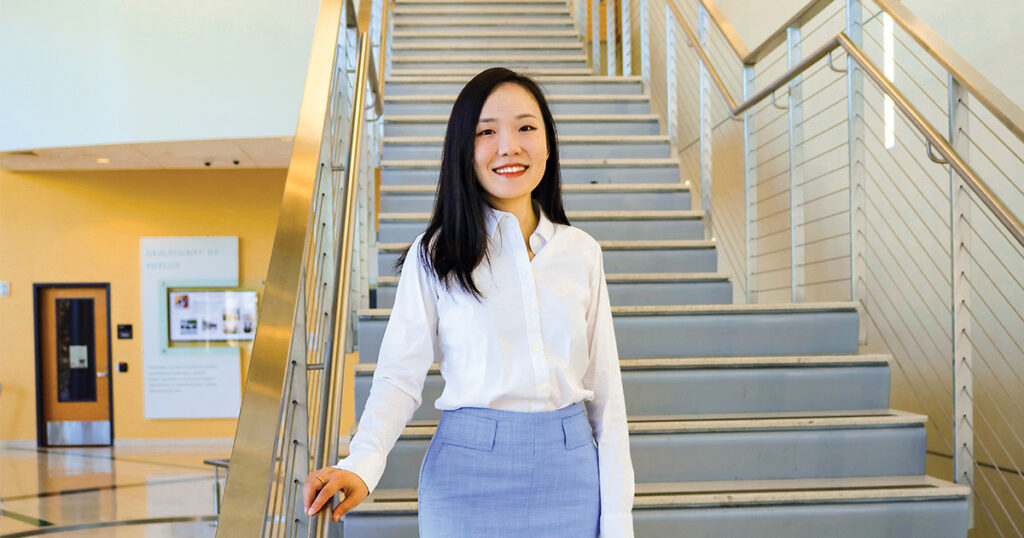Jianxin Xie earned her PhD in industrial and systems engineering from UT earlier this year after conducting research in the lab of Dan Doulet Early Career Assistant Professor Bing Yao. She also holds a bachelor’s degree in physics from Southeast University (‘16) and a master’s in industrial engineering and manufacturing from Florida State University (‘20). Xie is now an assistant professor at the University of Virginia (UVA) School of Data Science, integrating ISE with her physics background to develop realistic machine learning and data analytics tools for complex systems like the human heart.
While setting up her lab at UVA, Xie took a break to discuss her work and reminisce about her time in Knoxville.
What inspired you to go into ISE?
I’ve always been intrigued by the challenge of modeling complex systems. Industrial and systems engineers combine mathematics, science, and analytics, exploring the vast potential of data and technology to solve real-world problems. ISE can have an incredible impact on fields like healthcare—for example, by helping medical doctors make accurate diagnostic decisions and therapeutic plans. By leveraging techniques from this discipline, we can make healthcare more accessible, efficient, and beneficial for everyone.
What inspired you to apply your engineering skills to healthcare?
Healthcare affects everyone, irrespective of their background or social status, and currently faces many challenges that would benefit from my ISE background. Rapid advancements in machine learning present a unique opportunity to revolutionize diagnostics, treatment planning, and patient management. I believe that by blending engineering with healthcare, we can not only innovate and enhance medical technologies, but also improve patient outcomes and overall wellbeing.
Why did you pursue a multidisciplinary education?
Real-world problems are not limited to one domain or another; they overlap and intersect in intricate ways. By cultivating knowledge across multiple disciplines, I’ve been able to draw new connections, understand broader contexts, and innovate better solutions than I could have with just engineering or healthcare training alone.
Why did you choose to pursue your PhD at UT?
UT is renowned for its cutting-edge research, great faculty, and a uniquely rich collaborative environment with nearby institutions like ORNL. The ISE program also has a great reputation for blending theoretical knowledge with practical insights. The emphasis the university places on interdisciplinary research resonated with my own beliefs in a comprehensive approach to problem-solving.
What about UT made it a great place for your research interests?
UT is an incredible place for innovative thinking, especially when it comes to merging advanced machine learning technologies with industrial applications. The university’s cutting-edge facilities and commitment to research create an environment where ideas can thrive. At UT, we were not just looking at the challenges of today but actively crafting solutions for tomorrow.
What do you think will be the biggest impact of the research you conducted at UT?
The research I started at UT has the potential to revolutionize the way we understand and approach cardiac care. Integrating the laws of physics with the capabilities of machine learning will let us create more accurate, efficient, and robust models of the heart, paving the way for better diagnostic tools, more targeted treatments, and personalized patient care. I envision a future where healthcare professionals can make decisions based on comprehensive, real-time data, ensuring the best possible outcomes for patients.
Can you recall an experience during your time at UT that changed the way you approach research or collaboration?
My experience at UT was transformative. Beyond the academic rigor and cutting-edge research opportunities, what stands out to me the most is the community. UT has a thriving, interdisciplinary ecosystem of dedicated faculty, passionate students, and collaborative peers, all of whom have played an instrumental role in shaping my academic journey.
Both the ISE department and Tickle College of Engineering held a wide array of seminars, workshops, and showcases where researchers from diverse disciplines could network, share insights, and brainstorm innovative ideas. These invaluable events encouraged me to think beyond the conventional boundaries of my field.
I’d like to give a special mention to my advisor, Dr. Yao. Her unwavering support, mentorship, and belief in my capabilities were the driving forces behind every milestone I achieved at UT.
How will your dissertation results inform your research at UVA?
I plan to leverage the versatile set of research techniques I was trained in at UT to explore broader avenues in healthcare. My vision is to not just remain confined to a singular aspect but to advance healthcare from multiple dimensions, ensuring that the solutions I design are comprehensive, innovative, and truly beneficial to patients.
In addition to Xie, three other recent ISE alumni have become faculty at other institutions.
Zeyu Liu (PhD ’22) is an assistant professor at West Virginia University’s Statler College of Engineering and Mineral Resources. Liu earned his bachelor’s degree in management, information management, and information systems from Southeast University in 2018 before coming to UT. Liu was advised in his doctoral research by Dan Doulet Faculty Fellow and Professor Xueping Li and Associate Professor Anahita Khojandi, the Heath Endowed Faculty Fellow in Business and Engineering.
Tanveer Hossain Bhuiyan (PhD ’21) is an assistant professor at the University of Texas at San Antonio’s Klesse College of Engineering and Integrated Design. Before coming to UT, Bhuiyan earned his master’s degree in operations research from Mississippi State University (’18). He was advised in his doctoral research by Assistant Professor Hugh Medal.
Wenquan Dong (PhD ’21) is an assistant professor at the Texas State University Ingram School of Engineering. During his time at UT, Dong was advised by Department Head and John D. Tickle Professor Mingzhou Jin.
Contact
Izzie Gall (865-974-7203, egall4@utk.edu)
